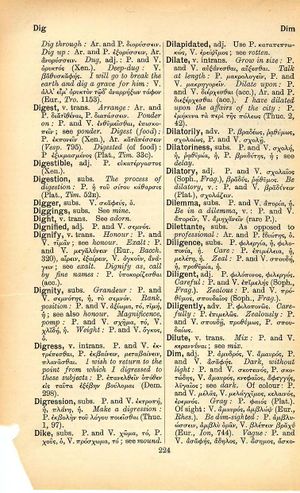dilemma: Difference between revisions
From LSJ
Έγ', ὦ ταλαίπωρ', αὐτὸς ὧν χρείᾳ πάρει. Τὰ πολλὰ γάρ τοι ῥήματ' ἢ τέρψαντά τι, ἢ δυσχεράναντ', ἢ κατοικτίσαντά πως, παρέσχε φωνὴν τοῖς ἀφωνήτοις τινά –> Wretched brother, tell him what you need. A multitude of words can be pleasurable, burdensome, or they can arouse pity somehow — they give a kind of voice to the voiceless.
(D_3) |
(Gf-D_3) |
||
| Line 1: | Line 1: | ||
{{Woodhouse1 | {{Woodhouse1 | ||
|Text=[[File:woodhouse_224.jpg|thumb|link= | |Text=[[File:woodhouse_224.jpg|thumb | ||
|link={{filepath:woodhouse_224.jpg}}]]'''subs.''' | |||
P. and V. [[ἀπορία]], ἡ. | P. and V. [[ἀπορία]], ἡ. | ||
Revision as of 07:35, 14 August 2017
English > Greek (Woodhouse)
subs.
P. and V. ἀπορία, ἡ.
Be in a dilemma, v.: P. and V. ἀπορεῖν, V. ἀμηχανεῖν (rare P.).
Latin > English (Lewis & Short)
dĭlemma: ătis, n. (δίλημμα),
I a double proposition, a dilemma; in logic, an argument in which an adversary is pinned between two difficulties, Serv. Verg. A. 2, 675, and 10, 449.
Latin > French (Gaffiot 2016)
dĭlēmma, ătis, n. (δίλημμα), dilemme [sorte d’argument] : Serv. En. 10, 449.

